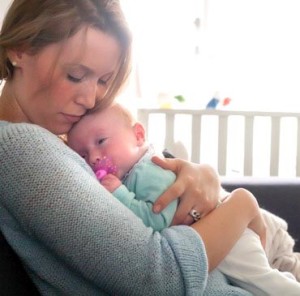Risk Factors, Symptoms, and What To Do

The Baby Blues has become as much an accepted part of being a new mother as engorged breasts and sleep deprivation. But what if the Blues don’t go away? For 10-20% of new mothers, Postpartum Depression (PPD) is an unwanted and difficult part of the first year of motherhood. The causes of PPD are many, and can include hormonal and lifestyle changes, a lack of social support, sleep deprivation, a high-risk pregnancy, a traumatic birth or difficult recovery, or breastfeeding problems. You are also at a higher risk of PPD if you have suffered previously from depression, or have recent losses or trauma in your life. Symptoms of PPD and related disorders can include:
- Feeling sad, depressed, numb, or crying a lot
- Restlessness or irritability
- Unusually strong feelings of anger or resentment
- Lack of energy
- Having headaches, chest pains, heart palpitations, numbness, tingling, dizziness or nausea, hyperventilation or other unexplained physical symptoms
- Difficulty sleeping or excessive tiredness
- Loss of appetite or conversely, overeating and weight gain
- Difficulty concentrating, remembering, and making decisions, or confusion
- Excessive worry about the baby or lack of interest in the baby
- Feelings of guilt and worthlessness
- Lack of interest or pleasure in activities
- Obsessive thoughts or compulsive behaviors
- Fear of hurting the baby or yourself
Many mothers experience only a few of these symptoms, but if you feel like something is wrong and you’re not quite yourself, that is an important signal. If these symptoms persist for two weeks or more, the mother should promptly get support by talking to her doctor or a mental health professional. PPD is a highly treatable condition, with therapy, medication, or a combination of the two.
If you need medication and you are told that you must give up breastfeeding, make sure you get the advice of a psychiatrist who is knowledgeable about medications for breastfeeding mothers. There are a few antidepressants which are routinely prescribed for breastfeeding mothers with untraceable amounts detectable in the baby’s bloodstream. Moreover, breastfeeding can be beneficial both for the depressed mother, the long-term health of her baby, and bonding, which is even more challenging when a mother is depressed.
Depression not only affects you: it affects your relationships with your partner and your baby. Untreated, depression can lead to bonding difficulties and delayed development or failure to thrive. Getting the help you need to recover quickly is the best thing you can do for your baby and yourself.
Most importantly, tell your support people (your family, friends, partner) how you are feeling. The burden of trying to seem happy and “keeping it all together” can make the depression worse. You need to lean on the people who care about you, get as much help as you need until you’re back to feeling like yourself, and don’t beat yourself up for having PPD. It is NOT YOUR FAULT.
 What is it exactly that makes a committed relationship work, after kids come into the picture? It’s maintaining a loving and safe connection that allows new parents to weather the storms of raising kids with their relationship intact.
What is it exactly that makes a committed relationship work, after kids come into the picture? It’s maintaining a loving and safe connection that allows new parents to weather the storms of raising kids with their relationship intact. If you’re like me, I really thought that, despite my decision to breastfeed, my husband was so gung ho about being a Dad that we would share the parenting responsibilities pretty equally once our first child was born. I was in for a rude awakening. Breastfeeding meant that much of the time I was literally attached to my new baby, and when I was not, I had an easier time calming him than my husband did. And even when I didn’t, I couldn’t stand to have my husband trying to comfort our fussy baby without stepping in and trying to help. Whether due to biology or psychology, I was so attached to my new baby that I couldn’t tear myself away long enough to really get a break. As a result, I became more comfortable in the baby care role, and he became less.
If you’re like me, I really thought that, despite my decision to breastfeed, my husband was so gung ho about being a Dad that we would share the parenting responsibilities pretty equally once our first child was born. I was in for a rude awakening. Breastfeeding meant that much of the time I was literally attached to my new baby, and when I was not, I had an easier time calming him than my husband did. And even when I didn’t, I couldn’t stand to have my husband trying to comfort our fussy baby without stepping in and trying to help. Whether due to biology or psychology, I was so attached to my new baby that I couldn’t tear myself away long enough to really get a break. As a result, I became more comfortable in the baby care role, and he became less.